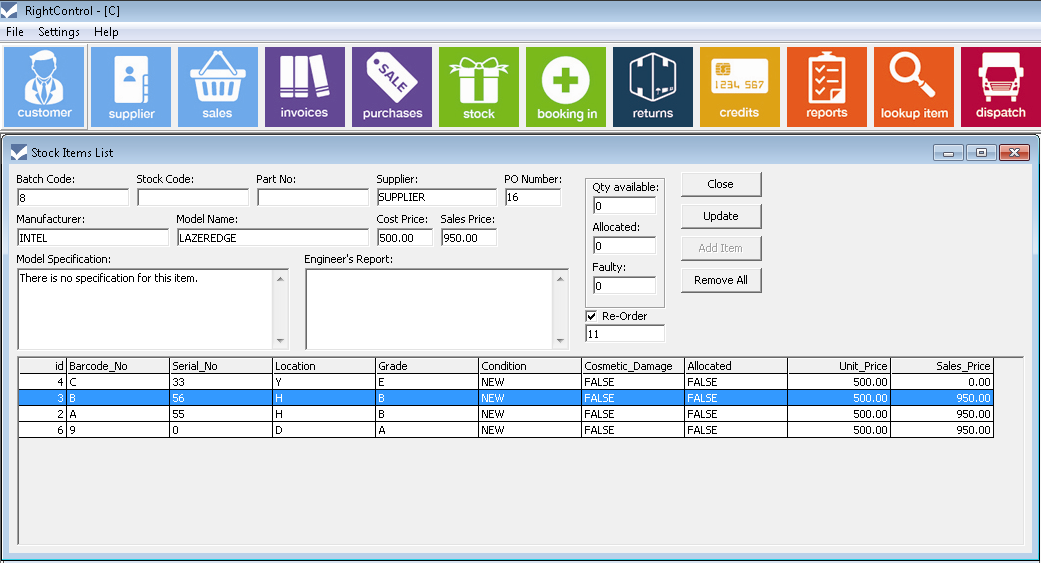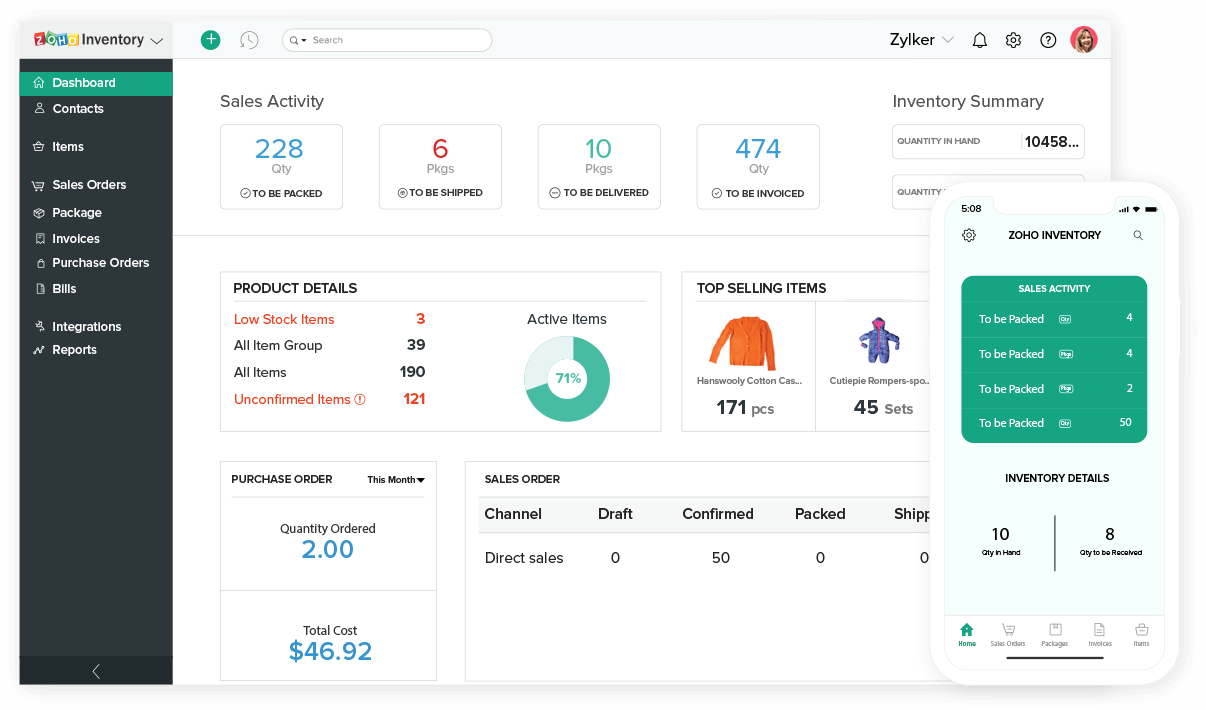Small business software for inventory and sales is the linchpin of efficient operations for businesses of all sizes. This powerful tool provides a comprehensive solution for managing inventory, tracking sales, and streamlining business processes, empowering small businesses to achieve greater success.
In this article, we will delve into the key features, benefits, and considerations associated with small business software for inventory and sales, providing valuable insights to help you make informed decisions and optimize your business operations.
Understanding the Market for Small Business Software: Small Business Software For Inventory And Sales
The market for small business software for inventory and sales is a rapidly growing one, driven by the increasing number of small businesses and the need for these businesses to manage their operations efficiently.
The key players in this market include QuickBooks, NetSuite, Sage, and Microsoft Dynamics. QuickBooks is the market leader, with a market share of over 50%. NetSuite is a close second, with a market share of around 20%. Sage and Microsoft Dynamics have market shares of around 10% each.
The growth potential for this market is significant. The number of small businesses is expected to grow by over 20% in the next five years. This growth will be driven by the increasing number of people starting their own businesses, as well as the growth of the gig economy.
The industry trends in this market include the increasing adoption of cloud-based software, the growing use of mobile devices, and the increasing demand for integrated software solutions.
Key Market Trends
- Increasing adoption of cloud-based software: Cloud-based software is becoming increasingly popular for small businesses because it is affordable, easy to use, and accessible from anywhere.
- Growing use of mobile devices: Mobile devices are becoming increasingly important for small businesses because they allow employees to access their data and applications from anywhere.
- Increasing demand for integrated software solutions: Small businesses are increasingly looking for software solutions that can integrate with their other business applications, such as accounting, CRM, and e-commerce.
Key Features and Functionality
Small business software for inventory and sales offers a range of features and functionality designed to streamline operations, improve efficiency, and enhance profitability.
Key features include:
Inventory Management
- Product catalog: Create and manage a catalog of products, including descriptions, images, and pricing.
- Inventory tracking: Track inventory levels in real-time, including stock on hand, on order, and committed.
- Reorder point management: Set reorder points to automatically generate purchase orders when inventory levels fall below a certain threshold.
- Inventory valuation: Track the value of inventory using different valuation methods (e.g., FIFO, LIFO, weighted average).
Sales Management
- Customer management: Manage customer information, including contact details, purchase history, and preferences.
- Order processing: Process orders quickly and efficiently, including order entry, payment processing, and order fulfillment.
- Sales tracking: Track sales performance, including revenue, profit, and sales trends.
- Reporting: Generate reports on inventory levels, sales performance, and customer behavior.
Integration with Other Systems
- Accounting software: Integrate with accounting software to automatically update inventory and sales transactions.
- E-commerce platforms: Integrate with e-commerce platforms to manage online orders and inventory.
- Shipping carriers: Integrate with shipping carriers to automate shipping processes and generate shipping labels.
Integration and Compatibility

For small businesses, software integration and compatibility are crucial for streamlining operations and maximizing efficiency. Integrating different software solutions allows them to share data and automate tasks, eliminating manual processes and reducing errors.
Various types of integrations can benefit small businesses:
Data Integration
Enables seamless data sharing between different software systems, ensuring consistent and up-to-date information across all departments.
Process Integration
Automates workflows and eliminates manual tasks by connecting different software systems, such as automating order processing or inventory updates.
System Integration
Provides a centralized platform for managing multiple software systems, allowing for seamless data exchange and streamlined operations.
Popular Software Integrations for Inventory and Sales Management
| Integration Type | Benefits | Examples |
|---|---|---|
| E-commerce Integration | Synchronizes inventory and sales data with online stores | Shopify, WooCommerce |
| CRM Integration | Manages customer relationships and provides insights into sales performance | Salesforce, HubSpot |
| Accounting Integration | Automates financial processes and reconciles inventory and sales data | QuickBooks, Xero |
Pricing and Value
Pricing models for small business software for inventory and sales vary depending on the features offered, the number of users, and the level of support provided. Some common pricing models include:
- Subscription-based pricing: A monthly or annual fee that gives access to the software and its features.
- Per-user pricing: A fee for each user who has access to the software.
- Tiered pricing: Different pricing tiers based on the number of features or the level of support included.
- One-time purchase: A single payment that gives perpetual access to the software.
Factors that influence pricing include:
- Features: The more features a software offers, the higher the price is likely to be.
- Support: The level of support provided, such as phone, email, or chat support, can also affect the price.
- Implementation costs: Some software may require professional implementation services, which can add to the overall cost.
The following table compares the pricing of different software options:
| Software | Pricing Model | Features | Support | Implementation Costs |
|—|—|—|—|—|
| QuickBooks Online | Subscription-based | Basic accounting, invoicing, and inventory management | 24/7 phone and email support | Professional implementation available |
| Xero | Subscription-based | Advanced accounting, invoicing, and inventory management | 24/7 phone and email support | Professional implementation available |
| NetSuite | Tiered pricing | Comprehensive accounting, CRM, and inventory management | 24/7 phone, email, and chat support | Professional implementation required |
| Sage 50cloud | One-time purchase | Basic accounting, invoicing, and inventory management | Limited phone and email support | Professional implementation available |
Implementation and Support

Implementing small business software for inventory and sales requires careful planning and execution. The process typically involves:
– Defining business requirements and goals
– Selecting and purchasing the software
– Installing and configuring the software
– Training staff on the software’s use
– Go-live and ongoing support
Training and support are crucial for successful implementation. Well-trained staff can effectively use the software’s features and functionality, leading to improved efficiency and productivity. Ongoing support ensures that any issues or challenges are promptly addressed, minimizing downtime and maximizing the software’s benefits.
Software Vendors with Comprehensive Implementation and Support Services
Several software vendors offer comprehensive implementation and support services to assist small businesses with their inventory and sales management needs. These vendors typically provide:
– Dedicated implementation specialists
– Customized training programs
– Ongoing technical support
– Regular software updates and enhancements
Case Studies and Success Stories

Small businesses that have successfully implemented inventory and sales software have experienced numerous benefits, including increased efficiency, improved accuracy, and enhanced customer satisfaction. These case studies highlight the positive impact that inventory and sales software can have on small businesses.
Increased Efficiency
One of the key benefits of inventory and sales software is that it can help businesses streamline their operations and improve efficiency. By automating tasks such as inventory tracking, order processing, and invoicing, businesses can save time and resources.
For example, a small business that sells clothing used to spend hours each week manually tracking inventory levels. After implementing inventory and sales software, the business was able to automate this process, saving them a significant amount of time. The business was also able to improve accuracy by reducing the number of errors that were made when tracking inventory manually.
Improved Accuracy, Small business software for inventory and sales
Another benefit of inventory and sales software is that it can help businesses improve accuracy. By automating tasks such as order processing and invoicing, businesses can reduce the number of errors that are made. This can lead to increased customer satisfaction and improved profitability.
For example, a small business that sells electronics used to experience a high number of errors when processing orders. After implementing inventory and sales software, the business was able to reduce the number of errors by 90%. This led to increased customer satisfaction and improved profitability.
Enhanced Customer Satisfaction
Inventory and sales software can also help businesses enhance customer satisfaction. By providing customers with real-time information about inventory levels and order status, businesses can improve the customer experience. This can lead to increased sales and repeat business.
For example, a small business that sells furniture used to have a difficult time keeping track of inventory levels. This often led to customers being disappointed when they ordered items that were out of stock. After implementing inventory and sales software, the business was able to provide customers with real-time information about inventory levels. This led to increased customer satisfaction and sales.
Future Trends and Innovations
The future of small business software for inventory and sales is bright, with emerging trends and innovations shaping the industry. These advancements are driven by technological advancements, changing customer demands, and the need for businesses to streamline operations and stay competitive.
One key trend is the adoption of cloud-based software. Cloud-based solutions offer several advantages over traditional on-premise software, including lower upfront costs, increased flexibility, and easier access to data from anywhere. Additionally, cloud-based software can be more easily integrated with other business applications, such as accounting and CRM systems.
Artificial Intelligence and Machine Learning
Artificial intelligence (AI) and machine learning (ML) are also playing an increasingly important role in small business software. AI-powered solutions can automate tasks, such as inventory management and sales forecasting, freeing up business owners to focus on more strategic initiatives. ML algorithms can analyze data to identify patterns and trends, which can help businesses make better decisions about inventory levels, pricing, and marketing campaigns.
Mobile and E-commerce Integration
The rise of mobile commerce and e-commerce has led to a growing demand for software that can integrate with these channels. Small businesses need software that can help them manage inventory, process orders, and track shipments across multiple channels. Software that integrates with e-commerce platforms, such as Shopify and WooCommerce, can help businesses streamline their operations and reach a wider audience.
Sustainability and Environmental Consciousness
As consumers become more environmentally conscious, small businesses are looking for software that can help them reduce their environmental impact. This includes software that can track and reduce waste, optimize energy consumption, and use sustainable materials. Software that helps businesses meet environmental regulations and standards can also be a valuable asset.
Final Review
In conclusion, small business software for inventory and sales is an indispensable tool for businesses seeking to streamline operations, enhance efficiency, and drive growth. By carefully evaluating your business needs and choosing the right software solution, you can unlock the full potential of your inventory and sales management processes, setting your business on a path to sustained success.
Quick FAQs
What are the key benefits of using small business software for inventory and sales?
Small business software for inventory and sales offers numerous benefits, including improved inventory accuracy, reduced manual errors, streamlined sales processes, enhanced customer service, and valuable insights for data-driven decision-making.
How do I choose the right small business software for inventory and sales?
To choose the right software, consider your business size, industry, specific needs, budget, and ease of use. Research different options, read reviews, and consider vendor support to find the solution that best aligns with your requirements.
What are some common features of small business software for inventory and sales?
Common features include inventory tracking, sales order management, customer relationship management (CRM), reporting and analytics, and integration with other business applications.